Election slogan of "casting vote for one's desired candidate without fear" has been a showy publicity for Dalits and poor people of Bajhang. Life of Dalits is crushing and with no control over their living conditions. Their concern is: "Imagine our fate if we cast our vote against landlord's desire when we are compelled to take their permission on trivial issues."
-Basanta Pratap Singh : Centre for Investigative Journalism -Nepal
Some 35 Dalit families of Kailash Village Development Committee (VDC) ward no 5, Bajhang district exercised their voting rights by casting their votes for Rastriya Prajatantra Party VDC presidential contender during the 2054 BS local elections. The Dalits' ‘decisive' votes – which played a vital role in his victory – worsened the situation thus infuriating non-Dalit supporters of Nepali Congress and CPN-UML.
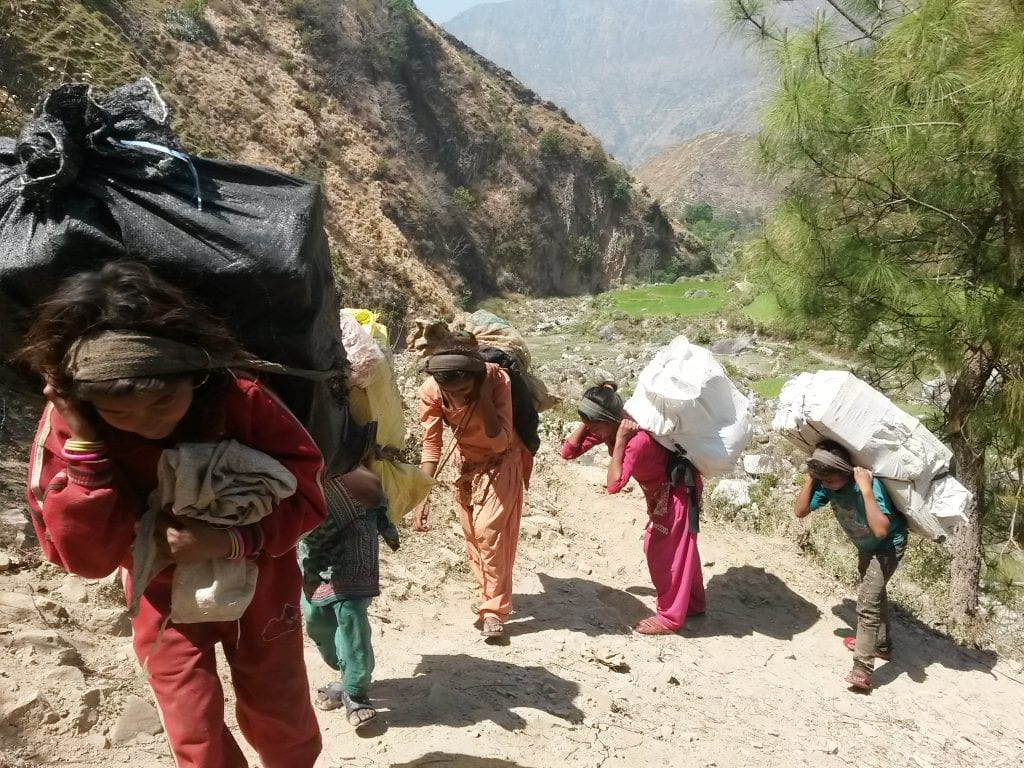
livelihood is dependent on porter business: Children of Badi community, Thalara.
Dalits had no choice than to apologize by "acknowledging the mistake" before the non-Dalit cadres of Nepali Congress and CPN-UML. Shivu said they had no choice than to bow their heads down to non-Dalit's feet and honoring them of being their guardian. "As a penalty, we offered a goat, some cash and bemoaned before them to prevent social exclusion," he recalled adding, "Non-Dalits showed gratefulness to ‘forgive' us by considering our assurances of not repeating this mistake." They, however, did not accept the goat and cash. This happened some 20 years ago.
Interestingly, 16 years down the line in the Constituent Assembly elections, the majority of Dalits in Kailash VDC, Bajhang could not cast their votes for their desired candidate with the fear of being socially excluded. Those not heeding to political pressure were harassed and offended.
Some 18 Dalit families of Biskhet, Sabik Koiralkot VDC-9 were not only thrashed for defying political pressure while exercising their voting rights but received threats of displacement. Following the announcement of the election result, non-Dalits misbehaved and thrashed Dalits alleging them of not casting their votes in favor of NC and UML candidates. Several Dalits, including Padam Damai, Madan Damai, and Ramesh Damai were injured in retaliation. Sixty-two years old Giri Damai said, "They threatened to displace us. Chances of our houses being demolished were high."
Narrating the entire incident, Giri added, "Assurances that we voted for their candidate during the previous elections failed to convince them. In fact, we apologized for going against their desires. However, they rebuked us by saying that we did not abide by their directives even as we stay in their lands." The issue was resolved to some extent following initiatives by some non-Dalits of the neighboring village. However, Dalits say they are at times still undergo harassment. Padam Damai says, "Let's see what happens during this election because we know one or the other party is sure to intimidate us."
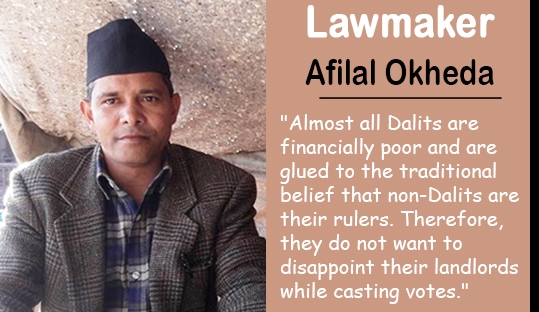 Several landless Dalit families working as Haliyas (bonded laborers) for their livelihood since generations in Bajhang are in trouble because the lands in which they have built their houses belong to non-Dalits. For 65-year-old Chakhudi Damai, a witness of the inhuman behavior of non-Dalits, elections bring trouble. "Whoever wins or reaps the yield is not a matter of concern for us. However, after all, we are the ones to be victimized," she says adding, "Election is worthless for us," she adds.
Several landless Dalit families working as Haliyas (bonded laborers) for their livelihood since generations in Bajhang are in trouble because the lands in which they have built their houses belong to non-Dalits. For 65-year-old Chakhudi Damai, a witness of the inhuman behavior of non-Dalits, elections bring trouble. "Whoever wins or reaps the yield is not a matter of concern for us. However, after all, we are the ones to be victimized," she says adding, "Election is worthless for us," she adds.
Forget about Sabik Koiralkot VDC and Kailash VDC, which is a one-day walk and a two-hour walk from Chainpur, Bajhang district headquarters respectively, there are instances of underprivileged people of Chainpur being compelled to cast their ballots against their choice at the Balmandir Primary School voting center, which is at a stone's throw from District Administration Office, District Police Office and Office of the Election Commission.
For instance, cadres of Nepali Congress and CPN-UML clashed at the voting center while each side trying to snatch ballot papers from Badi community in Chainpur during the 2070 Constituent Assembly elections. An eye witness of the incident, Samrat Singh, a journalist, says, "Badi voters, who were waiting for their turn to exercise their voting rights were deprived of casting their votes as major party cadres snatched their ballot papers ensuing clash between party cadres." In fact, the major party cadres had already convinced Badi voters to exchange ballot papers with liquor and money.
According to Dharma Badi, several Badi voters were lured with liquor and money. "Those who opposed to the idea were threatened of physical assault," he said adding, "Distribution of liquor, rice, and money has already begun here. Let's see what happens next?" he quipped.
In fact, the underlying reason for exploiting Dalit's vote is because according to a ‘profile' prepared by Bajhang District Development Committee (DDC), 12 thousand 416 out of 22 thousand 194 Dalit people in the district are illiterate. Likewise, 16 hundred 83 Dalit families are landless while one thousand 63 families are homeless. Among them, 13 hundred 22 families live in slopes and landslide prone areas.
Among the total population of Dalits, only 2.43 per cent are able to sustain for the whole year by their cultivation while 73.66 per cent is able to sustain for a meager three months. According to the DDC Profile, the trend of going to India for employment is common among Dalit communities. Among the 11 thousand 405 Nepali Dalits working in India, 6 thousand 31 are women, which means Dalit women working in India have surpassed the number than men. Other communities from Bajhang doesn’t follow the Dalits trend of sending women aboard for employment.
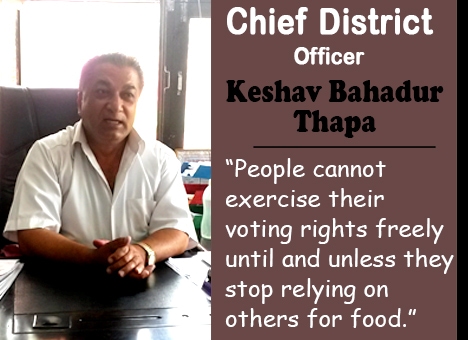 According to the District Land Revenue Office, 2 thousand 8 hundred 48 Dalits have been identified as Haliyas. Several of them are compelled to toil in non-Dalit's fields against loan-interest. The practice of bonded laborers, tailoring, pottery, porters, cleaners during marriage ceremonies, among others to pay back the loan are still prevalent in the district. Therefore, taking advantage of Dalit's weak political and economic access, non-Dalits try to lure them during elections by ‘trading' their votes. Lawmaker Afilal Okheda says, "Almost all Dalits are financially poor and are glued to the traditional belief that non-Dalits are their rulers. Therefore, they do not want to disappoint their landlords while casting votes."
According to the District Land Revenue Office, 2 thousand 8 hundred 48 Dalits have been identified as Haliyas. Several of them are compelled to toil in non-Dalit's fields against loan-interest. The practice of bonded laborers, tailoring, pottery, porters, cleaners during marriage ceremonies, among others to pay back the loan are still prevalent in the district. Therefore, taking advantage of Dalit's weak political and economic access, non-Dalits try to lure them during elections by ‘trading' their votes. Lawmaker Afilal Okheda says, "Almost all Dalits are financially poor and are glued to the traditional belief that non-Dalits are their rulers. Therefore, they do not want to disappoint their landlords while casting votes."
Okheda, also a human rights activist, says, "What I have seen during my tour is that several Dalit families in the district still hesitate to decide on their own." He said that Dalits have to undergo tremendous social and economic barriers if they exercise their voting rights on their own. They undergo agonies leading to deprivation of road access, drinking water, among other day-to-day affairs.
Dalits are so looked down upon that non-Dalit candidates often claim Dalit settlement of being under their control. Some non-Dalits of the village try to brainwash Dalits saying that all votes of the Dalit village will go to a certain party candidate. Okheda says, "Votes of Dalits are often put on sale."
Bikram Okheda, vice chairman of Dalit Class Development Committee under the Bajhang District Coordination Committee says, "Non-Dalit leaders do not go to Dalit villages to ask for votes considering that Dalit votes are under the control of a certain group." In fact, Dalit votes are ‘bargained' in the society. "Several leaders in the village claim to have controlled the votes of Dalits in the village," Bikram said.
Former Dalit representative of Bajhang district, Dharmaraj Bi Ka queries, "How can we expect Dalits to cast their votes in a free and fair manner when their property is beyond their control of others and the land they have built their houses on are registered in the names of non-Dalits?"
Following footsteps of landlords
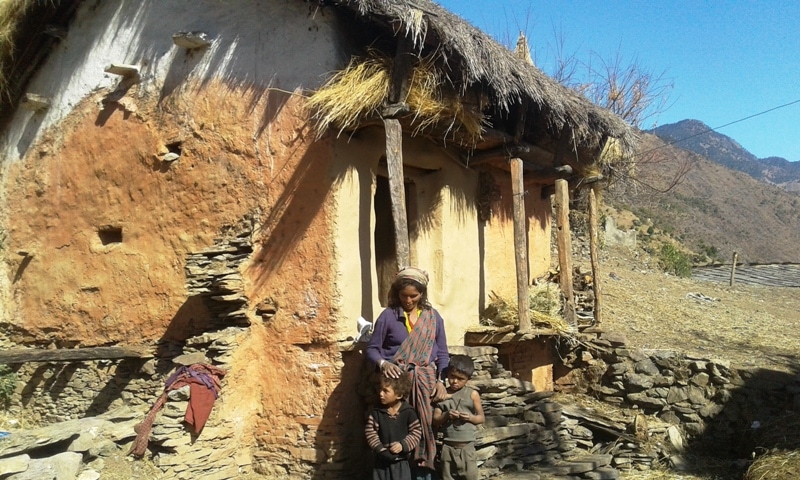
Dalit woman of Sunikot: House belongs to her but the land owner is non-Dalit.
There is an underlying reason for this. Financially underprivileged Thakuri had taken a loan of Rs. one thousand from a local businessman in 2053 BS to go to India to work with the condition that he would pay back Rs. one thousand Indian currency after four months. Failure to pay back the amount on time turned out to be detrimental owing to the interest rate of 5 percent per annum. He said that the total loan amount, including the interest tolled at Rs. two thousand six hundred the next year. Thakuri is still paying the interest to the local businessman. "When I have to take permission to sell my goat, what would be my fate if I cast my vote without his consent?" he queries.
The Poor Households Support Coordination Board – formed during the tenure of Prime Minister Dr. Babu Ram Bhattarai – in its survey carried out in several districts has identified 14 thousand 153 out of 33 thousand 773 families living under poverty line in Bajhang district. In the survey carried out in 30 thousand 328 households in Bajhang, 14 thousand 731 families are identified as ‘well-to-do' while the details of 5 thousand 444 families have been found incomplete.
District Coordination Committee Information Officer, Birendra Bahadur Singh assumes that the number of families living under poverty line will further increase if re-survey is carried out in the district. Bajhang is in the 74th position, which is next to Bajura in the Human Development Index with a poverty rate of 56.8 percent. This indicates that half of the district population is under the poverty line.
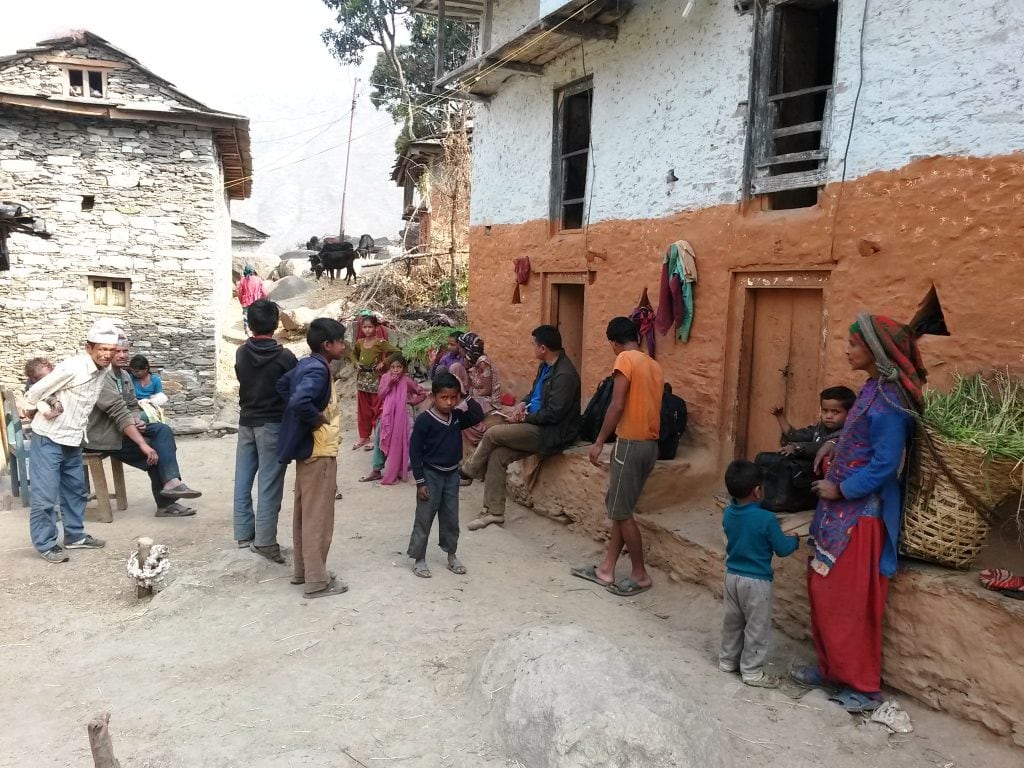
Haliyas (Bonded laborer) of Koiralkot, Biskhet: Some youths were beaten on allegation for freely voting in previous Constitution Assembly election by non-Dalits.
According to Bajhang District Profile 2070 BS, the average literacy rate of Bajhang is 55.50 percent while women average literacy rate stands at 40.12 percent. Concurring to Singh, former lawmaker Okheda says, "Non-Dalits are no exception but their woes are suppressed. Exploitation and suppression by the well-off families have forced them to flee from their villages in the district."
Chief District Officer Keshav Bahadur Thapa argues democracy holds no significance if voters cannot cast their votes on their own. Thapa, who has acquired a lot about the country's poverty during his tenure with the National Planning Commission emphasizes on launching programs that would help people to be self-reliant. "People cannot exercise their voting rights freely until and unless they stop relying on others for food," he stated.
The District Administration Office is responsible for identifying and providing security to voters. He expressed helplessness since cases of poor people being manhandled, humiliated or exploited are settled in villages. "Trend of winning by snatching other's rights has been widely practiced. Candidates have seized voters' rights," he said.
Asked to comment on the voters' complaints of not being able to vote freely, Chief Election Officer Purna Prasad Bastola skipped the question saying that he would rather "not comment on a political issue". He, however, said that voters are free to cast their votes for their desired candidate. "I cannot say anything more than this," he said.



